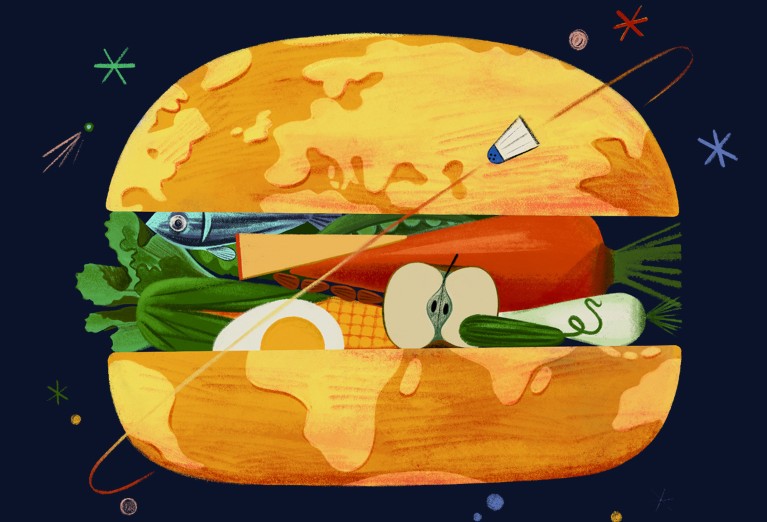- NEWS FEATURE
- Clarification 21 December 2021
What humanity should eat to stay healthy and save the planet

Illustration by Paweł Jońca
Access options
Access Nature and 54 other Nature Portfolio journals
Get Nature+, our best-value online-access subscription
$29.99 / 30 days
cancel any time
Subscribe to this journal
Receive 51 print issues and online access
$199.00 per year
only $3.90 per issue
Rent or buy this article
Prices vary by article type
from$1.95
to$39.95
Prices may be subject to local taxes which are calculated during checkout
Nature 600, 22-25 (2021)
doi: https://doi.org/10.1038/d41586-021-03565-5
Updates & Corrections
-
Clarification 21 December 2021: An earlier version of this feature misquoted Iannotti’s explanation of how the FAO committee would improve on the EAT–Lancet analysis. The committee is not redoing the study, but rather doing a separate analysis that might overlap with the original work.
References
Iannotti, L. L. et al. Pediatrics 140, e20163459 (2017).
GBD 2017 Diet Collaborators. Lancet 393, 1958–1972 (2019).
Springmann, M. et al. Lancet Planet. Health 2, e451–e461 (2018).
Willett, W. et al. Lancet 393, 447–492 (2019).
Clark, M. A. et al. Science 370, 705–708 (2020).
Tilman, D. & Clark, M. Nature 515, 518–522 (2014).
Merrigan, K. et al. Science 350, 165–166 (2015).
Steffen, W. et al. Science 347, 1259855 (2015).
Elinder, L. S., Eustachio Colombo, P., Patterson, E., Parlesak, A. & Lindroos, A. K. Sustainability 12, 8475 (2020).
Semba, R. D., Ramsing, R., Rahman, N. & Bloem, M. J. Agric. Food Syst. Community Dev. 10, 205–213 (2020).
Chaudhary, A. & Krishna, V. One Earth 4, 531–544 (2021).
Hirvonen, K., Bai, Y., Headey, D. & Masters, W. A. Lancet Glob. Health 8, e59–e66 (2020).

 Nature Outlook: Sustainable nutrition
Nature Outlook: Sustainable nutrition
 A safe operating space for humanity
A safe operating space for humanity






